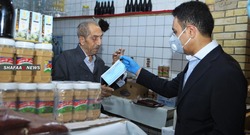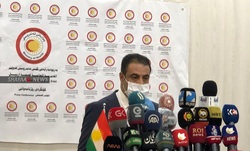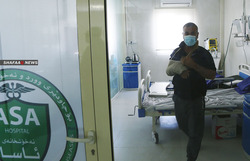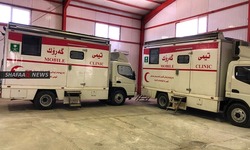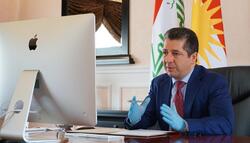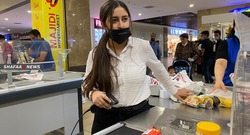‘I feel free when I run’: the young women enjoying a sense of freedom in Kurdistan
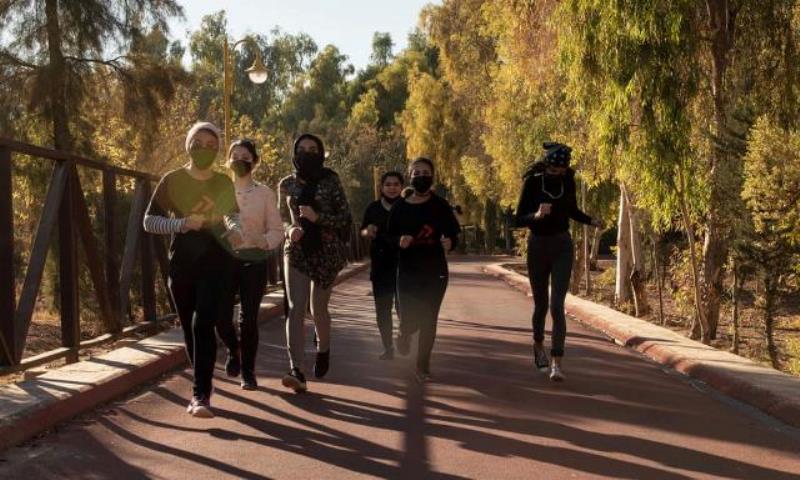
Shafaq News/ The mountains of Iraqi Kurdistan are edged with a tangerine glow as our minibus drives past them. We set off earlier from Erbil, the region’s capital, and are driving to Shaqlawa, a historic city about 50 minutes away, to hike up the nearby Safeen mountain. Inside the minibus, a group of teenage girls are playing their favourite songs.
The teenagers live with their families in one of Erbil’s two main camps for internally displaced people (IDPs), Baharka and Harsham, having fled Mosul, Iraq’s second-largest city, and surrounding towns such as Tal Afar and Sinjar, when the area was captured by ISIS in 2014. The hike has been organised by Free to Run, an NGO that supports and empowers women and girls in regions of conflict through sport, offering them life-skills training, and creating safe spaces for them to develop confidence and friends, and to reclaim public space in a country where women’s rights are lacking.
War magnifies existing inequalities and makes women and girls, in particular, vulnerable to abuse and exploitation. The girls at Free to Run have lived through two: the Iraq War (2003-2011), and the war with ISIS (2014-2017). They’ve not only suffered the trauma of having to flee their homes. Many have lost loved ones and missed out on education. Now they are stuck in a cycle of poverty.
Free to Run was established in 2014 and the executive director is Taylor Smith, an American human-rights advocate. The programme has enrolled 30 girls from Baharka and Harsham this year alone. Smith told me that due to their age, backgrounds, and socioeconomic status as IDPs, the girls “struggle more with access to public life, the ability to play sports, and autonomy over their own bodies”. In their home towns, many of the programme’s participants were only allowed to play sport until they reached puberty, “at which point communities and families said it was inappropriate for them to continue”.
Faiza, who is 15, is one of the more confident girls participating in the Free to Run programme, and despite her gentle demeanour, her favourite sport is kickboxing, which the programme teaches. (Some names have been changed, to protect identities.) “Kickboxing isn’t just a form of exercise for me,” she says when we meet at her home. “It is a way to live my dreams.” Before she enrolled in Free to Run two years ago she was shy and withdrawn. “Even when someone said, ‘hi,’ I didn’t like to say ‘hi’ back. But now I feel stronger, like I can protect myself.”
Faiza lives in Baharka Camp, along with 2,700 other children, plus their families. The camp sits on a flat plain; Erbil rises out of the dust in the distance. When I visit, boys climb on the wire fence that surrounds the camp on its perimeter; all around there are tents and concrete blocks. When she’s not at school, Faiza helps her mother to clean their home, plays with Barbie dolls, and has started learning new languages. She has lived in the camp for several years; she left her home town when it was destroyed by Isis. “I feel sorry for my family,” she tells me. “I wish to get more money so I can buy a house for them and live in Erbil city, because I don’t like to stay in the camp. But we are forced to stay here – it is the only way.”
She describes her Iraqi home town as being “like a prison,” and says she wouldn’t want to return even if she could. “People there are stricter and more religious,” she tells me. If she were to leave her home without a hijab, she would be reprimanded. “Even running – they wouldn’t let me do it.” If she ever returns, she says, she “won’t be able to fulfil any of my dreams”.
She goes to get ready for school. When she returns, she is dressed in a white dress and a black hijab, and she is wearing a hint of red lipstick. She asks to have her photo taken for her ID. Last year, her father died of Covid – he was 37 – and before that Faiza’s grandfather was kidnapped and killed by Isis. She is the family’s eldest daughter, and now she is expected to marry quickly.
Child marriage is illegal in Kurdistan – Iraqi law states the minimum age for marriage is 18 – though it is still common and widespread. But some are fighting against this. Shaimaa, now 24, was one of the first girls to enrol with Free to Run, in 2018. She had divorced her husband, whom she married in 2015, aged 17, and who was abusive. Ashamed of Shaimaa’s decision to divorce, her family shunned her. One uncle beat her. But she persevered, eventually finding sanctuary in sports, particularly running, for which she has won numerous medals for.
She began encouraging other displaced women and girls to sign up to Free to Run, spreading the word around Baharka Camp, where she lived, before becoming a coach for the programme and working with Save The Children on local projects. In 2020, she moved out of the camp and into an apartment nearby. “I feel free when I run, far from prisons and war,” she said in an interview with Time Magazine last year. “I feel like there are no limits and nothing to stop me.”
Nine girls from the Free to Run programme, including Faiza and her neighbour, Laila, are taking part in the hike up Safeen Mmountain. Pine trees and apple trees dot the trail, which is steep and difficult in parts – loose stones make it slippery. A passing male hiker stops to say it is “too difficult for girls”, but the girls ignore him and continue upwards. Juan, Free to Run’s programme officer, a friendly Kurdish woman, leads the hike. She says the girls see her as not just their “second mother”, but also as their friend. It makes her proud to see the progress they make, she says. “Before [enrolling in Free to Run] they were depressed – I could see it in their faces. But month by month they started changing.”
We reach a cave, and the girls immediately start climbing the rocks and taking photos of each other. “[During the Free to Run programme] we learned not to be afraid any more,” says Wafaa, 16, as they tuck into their snacks. “Before, when we went to these places, we were afraid, and now we see it’s very normal and easy.” Hiba, a 14-year-old girl, adds philosophically: “Hiking is like life. It is challenging, but it is better to go through these challenges and get to the other end.”
Hiba lived in Mosul under the thumb of Isis, only leaving once the city was liberated following a lengthy battle in 2017. Her school was destroyed by the fighting, and her parents didn’t allow her to leave the house. “I just used to play inside my home with my sister and brother,” she says. “I was so scared I felt like I wanted to die – I wanted to get away from all these feelings. When I left my home in Mosul and came to Baharka Camp, all the way I felt scared that something bad would happen. But when I arrived in Erbil I could feel the freedom, like a big weight on my chest was lifted.”
One of the other girls, Bushra, is particularly boisterous, climbing and running around. Juan says she is always hyperactive and sometimes gets into trouble for it. The 16-year-old didn’t have any friends before joining Free to Run. “My mum used to ask me: ‘Why don’t you go out like other girls?’” she says. “I didn’t like to meet anyone, not even my relatives when they came to my home. My friends at Free to Run are the most wonderful thing that has ever happened to me.”
Bushra is from Mosul, and lived under Isis from 2014 to 2016. “I miss Mosul because I miss my dad – all my memories of him are there.” Bushra’s father was killed in 2016 by the terrorist group while he was fighting in the Iraqi army. A photo of him is stuck to a wall in their home in Harsham Camp, with a bouquet of fake flowers next to it. Although they receive financial compensation from the government, it is not enough, says her mother, who works as a cleaner at the school in the camp. Bushra’s extended family wanted her to stop school and marry her 16-year-old cousin, but Bushra refused, and her mother supported the decision. “I try to encourage my daughter to study in order to get a good job in the future and become independent,” she explains, sitting next to Bushra on the floor of their home. “I got married so young, when I was 15 years old. I don’t want my daughter to live the same life as me. I became a widow at 24, and had to provide for my family. I don’t want her to clean the same school that I clean now.” Bushra says she would like to be a lawyer when she’s older. “I want to help others who have been through a similar thing to us,” she tells me. “It is painful whenever we go to the government to ask for any help.”
There are 294 families inside Harsham Camp, including 811 children, who have little to do during the day when they are not at school, which only lasts a few hours. Mostly they play on the roads, though there have been accidents. Children have been hit by cars, says Alva Aied Ali, the Harsham Camp manager. When the government electricity runs out – power cuts are frequent – there is no back-up generator to keep the electricity going in the camp’s primary and secondary school. “Since the end of the war a lot of NGOs have withdrawn their support from the camp, so we are struggling,” says Aied Ali.
“Living in this camp is a bad situation and, especially for the children. It is like a prison. So [Free to Run] is a good opportunity for them to get away from the camp,” says Ayad, a serious-looking man with a thick black moustache. He is the father of Tagreed, 16, who joined Free to Run a year ago. We meet them at their home in Harsham Camp, where Tagreed lives with her parents, two sisters and four brothers. She enjoys the group’s “team spirit,” she says, and loves running – they train four times a week in a local park in Erbil and ran a 10k race in November. She hopes to run the Erbil Marathon in May 2022.
“I would not let my daughter carry on running when she stops the Free to Run programme, not because of me but because of the society inside the camp,” says Ayad. “Most of them are religious, strict people, so they will talk about my daughter if she goes out alone, even to the market or running. Even though she is young, people in the camp think that women should just go out for one reason – just to go to her husband’s house and to get married, nothing else.”
However, both Ayad and Diana, his wife, are adamant that Tagreed should finish her schooling. “I don’t care what society says, I will make all my children continue their education. I don’t want them to marry early – it is against my values,” says Diana.
Tagreed tells me that she wants to keep running, no matter what. “Even if the community don’t like me running in the park, I don’t care; I feel strong and I will continue with my running.” The girls have overcome many obstacles; they have many more to face in the future. Their horizons may have broadened since joining Free to Run, but a lot still depends on the willingness of their families and wider community to give them the right to control their own futures. I ask Juan if she thinks there is change in the air when it comes to the patriarchal culture that is still so ingrained. “It cannot change 180 degrees,” she says, “but actually I see it is changing 60 or 70 degrees, and that is good.”
On the drive back from the hike the girls stand up in the minibus and clap to the music, before deciding that is not enough. We pull over and they teach me some Arabic dance moves on the side of a road. Wafaa takes my hand and we dance in a circle, Bushra shakes her hips to the music, Laila claps, Hiba sways, and Faiza waves her hands in the air. Juan watches, laughing and clapping along. Even the occasional beep from a passing car won’t deter them.
